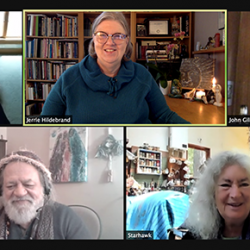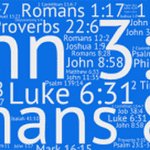“I think most UU’s come to us because they’re tired of all that external ritual stuff. They want something simple.”
“I really miss the liturgy and ritual of Catholicism, but I can’t stand the theology or the politics.”
I heard each of these sentiments on the same day from members of the same congregation, both lay leaders, both emotional about what they were sharing with me.
For my part, I come from a Roman Catholic background, began practicing in a Pagan way in 1991, and spent 12 years involved with an interfaith, Pagan organization before I started regularly attending a UU congregation.
Ritual is in my bones, in my heart, in my blood. I love the left-brained intellectual rigor and clarity of much of the Unitarian Universalist tradition, and I bring a history of ritual. Liturgy is the word I use to talk about UU worship and Pagan ceremony—liturgy, “the work of the people.” While I honor the relative simplicity of most of our worship, I also recognize—even in that simplicity—that it is liturgy. It is the shared work of the people come together.
This week is a big one for litrugy in the Catholic tradition (as well, nowadays, in some other Christian traditions). Tuesday was Mardi Gras, Wednesday is Ash Wednesday. The season of Lent begins.
Partly as a result of my post-Catholic, Pagan, UU identities, I have been ambivalent about Ash Wednesday for some years. Not because I don’t approve of Lent, mind you—a season to return to the heart of one’s tradition, to consider one’s relationship to social justice (particularly poverty), and to deepen one’s spiritual practices? I’m all over that.
But there’s this bit: “Remember, man, that thou art dust and unto dust you shall return.” Yes, we are children of Earth. And yes, She will be our tomb as she has been our cradle. Yes, we are born of the dust of Earth, of soil and bugs, of butterflies and beetles. As the Seventh Principle of Unitarian Universalism reminds us, we are all a part, all interbeing, as Thich Nhat Hahn says, of the interconnected web of existence. And that’s all great. It’s great!
As a priestess, I fully embrace this ceremonial emblem of connection with the close and holy darkness of Earth.
There is the historical diminishment of Earth in the Christian tradition. There is the historical sense that to be of dust is to be less-than or to be worthy only of being trampled upon. To be associated with Earth, to be Earth and to return to Earth is to be the lowest of the low.
Again, there’s nothing wrong with a little humility. But often, as many of us have experienced first-hand, the whole low-humility-repentance-penitence thing gets taken to an absurd, unhealthful, even abusive degree. So I propose a corrective.
As my colleague, Jonathan White reminds his students of Wicca year after year, we are children of Earth, yes, and of Starry Heaven.
Children of Earth and Starry Heaven.
Whatever our theology, that is true. Simple, clear, and true. We are of Earth. And we are of black holes and supernovae and red dwarfs and yellow stars (especially our own star, Sol). We are (as is Earth herself, come down to it) the children of hydrogen exploding, of molecules coming into being, of all that the universe contains. The interconnected, interdependent web of existence is not only Earthly, but universal.
“Remember you are a child of Earth and Starry Heaven.” So it is not only ashes that remind us who we are and who we need to be…it is also glitter, a sweet, postmodern reminder of the stars.
One year in seminary, one Ash Wednesday, I went to my friends who had ashes on their foreheads and asked them whether I could offer them another blessing. Every one of them said yes. I had a small, carved box full of very fine glitter. I opened the box, and pressed my finger to the glitter just a tiny bit, then pressed that finger onto the backs of my friends’ hands. “Remember,” I said, “you are of the dust of Earth and the dust of stars, a child of Earth and Starry Heaven.”
Both low and high, high and low. Both dark and light, light and dark. Full of both humility and pride. Paganisms are, at their best, traditions that embrace the whole of human—and non-human—experience. That broad embrace is something that Unitarian Universalism writ large may learn more deeply, or in new ways, from its Pagan practitioners.
In Unitarian Universalism, we can fall prey to thinking that “most UU’s” are like us. That “most UU’s” want more ceremony or less, more social justice or less, more ministerial involvement or less. But Unitarian Universalism has the chance to live into our Principles, as well as our Sources. To acknowledge our Protestant roots, our humanist middles, and the practices that have come into our traditions later on.
 Not all of us want to make Pagan ritual. Not all of us know who Curtis Reese is. Not all of us are interested in our Puritan ancestors or even in the Transcendentalists.
Not all of us want to make Pagan ritual. Not all of us know who Curtis Reese is. Not all of us are interested in our Puritan ancestors or even in the Transcendentalists.
Nonetheless, if we embrace one another in all our beautiful uniquenesses, then we will find ourselves made more spacious of heart. There will be more room in us to learn and to welcome those who now feel like the “stranger among us.”
Blessings on you and on your house.
images courtesy of shutterstock.com



















